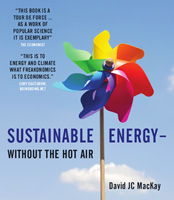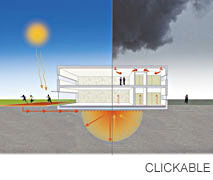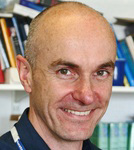Sustainable Energy
– without the hot air
David MacKay, professor of Physics at Cambridge, has published a wide ranging book on Sustainable Energy. He brings this huge subject down to size by measuring our use and sources of energy in understandable units on a human scale: kWh per day per person. He examines our uses of energy, and sources of energy and concludes that 90% of current energy used in the UK derives from fossil fuels and that this is clearly unsustainable.
He examines what sources of renewable energy are available and what quantity we could reasonably achieve from solar energy, wind power, wave power etc. and comes to some interesting conclusions about the scale of the problem and the practicalities involved.
This excellent book is freely available on line:
 You can download a synopsis, individual chapters, or the whole book.
You can download a synopsis, individual chapters, or the whole book.
The general chapters outline the renewable energy options.
The middle section is for those "Who want to make a difference".
The technical section provides well researched supporting detail and explanations.
David MacKay communicates his enthusiasm and takes you through some of his discoveries. He ends his chapter on Smarter Heating as follows:
"My conclusion: can we reduce the energy we consume for heating? Yes. Can we get off fossil fuels at the same time? Yes. Not forgetting the low-hanging fruit – building-insulation and thermostat adjustments – we should replace all our fossil-fuel heaters with electric-powered heat pumps; we can reduce the energy required to 25% of today’s levels. Of course this plan for electrification would require more electricity. But even if the extra electricity came from gas-fired power stations, that would still be a much better way to get heating than what we do today, simply setting fire to the gas. Heat pumps are future-proof, allowing us to heat buildings efficiently with electricity from any source.
Nay-sayers object that the coefficient of performance of air-source heat pumps is lousy – just 2 or 3. But their information is out of date. If we are careful to buy top-of-the-line heat pumps, we can do much better. The Japanese government legislated a decade-long efficiency drive that has greatly improved the performance of air-conditioners; thanks to this drive, there are now air-source heat pumps with a coefficient of performance of 4.9; these heat pumps can make hot water as well as hot air.
Another objection to heat pumps is “oh, we can’t approve of people fitting efficient air-source heaters, because they might use them for air- conditioning in the summer.” Come on – I hate gratuitous air-conditioning as much as anyone, but these heat pumps are four times more efficient than any other winter heating method! Show me a better choice. Wood pellets? Sure, a few wood-scavengers can burn wood. But there is not enough wood for everyone to do so. For forest-dwellers, there’s wood. For everyone else, there’s heat pumps."
His five energy plans for Britain all share a conclusion: use heat pumps
Having examined and quantified all the forms of practical sustainable energy Professor MacKay proposes five possible energy plans for Britain:
- one for those want to see diversity of supply from within Britain
- one for the Greens (no nuclear, no coal)
- one for those who don't like industrialising the British countryside (no wind farms, no nuclear)
- one for those who see nuclear as the solution and finally
- one for those who wish to see the most economic result from the market after a strong carbon tax
One notable conclusion is that the largest renewable energy source he proposes consistently across all five options is from heat pumps.
The Professor has done the sums – and drawn his conclusions. If you take time to read his book you are likely to come to similar conclusions.
Other nuggets from the Professor:
Turning phone chargers off when they are not in use is a feeble gesture, like bailing the Titanic with a teaspoon.
In contrast, turning the thermostat down (or the air-conditioning in hot climates) is the single most effective energy-saving technology available to a typical person. Every degree you turn it down will reduce your heating costs by 10%; and heating is likely to be the biggest form of energy consumption in most buildings in Britain.
Small-scale combined heat and power is another looming mistake. Yes, combined heat and power (that is, putting individual power stations in each building, generating local electricity and heat to keep the buildings warm) can be a slightly more efficient way of using fossil fuels than the standard way (namely, centralised power stations and local condensing boilers). But these CHP systems are only about 7% more efficient. And they use natural gas, which is a fossil fuel!
The good news is, there is a much better way to generate local heat: use heat pumps.
"I think that growth of gas-powered combined heat and power would be a mistake. Such combined heat and power is not green: it uses fossil fuel, and it locks us into continued use of fossil fuel. Given that heat pumps are a better technology, I believe we should leapfrog over gas-powered combined heat and power and go directly for heat pumps."
..................Roof-mounted micro-wind turbines are an utter waste of resources. They never pay for themselves. A "600 W" micro-turbine mounted on a typical roof in England generates only 0.04 kWh per day – only one twentieth of the power of a lightbulb.
In contrast, roof-mounted solar water heaters are a no-brainer. They really work: even where the sunniness is only about 30%, a modest 3-square-metre panel can supply half of a typical family's hot water: about 3.8 kWh per day, on average.

Conclusions
David MacKay discusses the options and quantifies the alternatives to allow you to come to your own conclusions, partly because some of the choices are emotional and subjective.
However, some of his conclusions are crystal clear: he gives strong support to solar heat capture and use of heat pumps – both well-established technologies. He discusses seasonal fluctuations in renewables and comes to the conclusion that “A useful technology will surely be long-term thermal storage.”
These three elements are at the heart of Interseasonal Heat Transfer and Renewable Heat.
Chief Scientific Advisor
Since writing his book David MacKay has been appointed as Chief Scientific Advisor to The Department of Energy and Climate Change (DECC).
The chief scientific advisor’s role is defined as, "ensuring that the Department’s policies and operations, and its contributions to wider Government issues, are underpinned by the best science and engineering advice available".
On being questioned on his new role as Chief Scientific Advisor David MacKay said:
“Climate change and secure energy are two of the most urgent issues facing the UK and the global community. The solutions must be rooted firmly in the science and I look forward to advising the Government on how it can help deliver these important goals.”
Sir David MacKay
David MacKay received a knighthood in the New Years Honours List 2016 "for services to Scientific Advice in Government and Science Outreach".
His many admirers were saddened to hear of his early death on 14 April 2016 at the early age of 48 from cancer. He was a deep thinker and gifted communicator to the end.
Providing Sustainable Energy
David MacKay writes about "Sustainable Energy – without the hot air".
ICAX provides sustainable energy – without the hot air.

